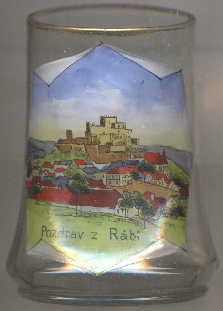

|
| ČESKÁ REPUBLIKA | CZECH REPUBLIC |
| Plzeňský kraj | Plzeň region |
| Okres: Klatovy |
Rabí (previously spelled Rábí; in German: Rabi and earlier Raby) is situated at an elevation of 478 m on the left bank of the river Otava, about 27 km southeast of the district town Klatovy and about 54 km south-southeast of the regional capital, Plzeň. As of 1 January 2023, the municipality had a population of 483.
 The earliest known written document mentioning Raby dates from 1380 when it was in possession of the lords of
Rýzmberk. The town church was consecrated in 1498, and in 1499 Raby was granted the privileges of a town. At the beginning
of the Thirty Years' War (1618–1648), in 1619 and 1620, various mercenary armies invaded and plundered Raby. After the
abolition of patrimonial rule, Rabí/Raby formed a town in the Prachin (Prácheň) district and the judicial
district of Horažďovice from 1850. In 1868 the municipality was reallocated to the
Strakonice district. At the beginning of the 20th century Rábí was used as the
Czech place name, which in 1924 was changed to the current form, Rabí. In 1948, Rabí lost its status as a
town and in 1949 it was placed into the new district Horažďovice, which in 1960 was merged into the district
Klatovy. The neighbouring communities of Bojanovice and Čepice were incorporated into the
municipality in 1992. In 2010, Rabí was reinstated as a town following a new law that no longer made this status dependent
on population size.
The earliest known written document mentioning Raby dates from 1380 when it was in possession of the lords of
Rýzmberk. The town church was consecrated in 1498, and in 1499 Raby was granted the privileges of a town. At the beginning
of the Thirty Years' War (1618–1648), in 1619 and 1620, various mercenary armies invaded and plundered Raby. After the
abolition of patrimonial rule, Rabí/Raby formed a town in the Prachin (Prácheň) district and the judicial
district of Horažďovice from 1850. In 1868 the municipality was reallocated to the
Strakonice district. At the beginning of the 20th century Rábí was used as the
Czech place name, which in 1924 was changed to the current form, Rabí. In 1948, Rabí lost its status as a
town and in 1949 it was placed into the new district Horažďovice, which in 1960 was merged into the district
Klatovy. The neighbouring communities of Bojanovice and Čepice were incorporated into the
municipality in 1992. In 2010, Rabí was reinstated as a town following a new law that no longer made this status dependent
on population size.
 Rabí castle is located on a prominent hill by the central course of the Otava River.
It is the largest castle (in terms of area) in the Czech Republic. It was declared a national monument in 1978.
The first mention of the castle dates from 1380, although it is not known exactly when it was founded. It is likely that it was
established after 1300 to protect trade routes along the river Otava and also to prospect gold deposits in it. In 1420–1421,
the Hussites conquered the castle twice. The slowly deteriorating complex was completely devastated during the Thirty Years' War
(1618–1648). In time it became a source of building material for local peasants. In 1920, it was donated to the
Horažďovice Society for the Preservation of Artistic, Cultural and Natural Monuments for a symbolic price of
1 Czech Crown. Since 1945 it is in possession of the Czech state.
Rabí castle is located on a prominent hill by the central course of the Otava River.
It is the largest castle (in terms of area) in the Czech Republic. It was declared a national monument in 1978.
The first mention of the castle dates from 1380, although it is not known exactly when it was founded. It is likely that it was
established after 1300 to protect trade routes along the river Otava and also to prospect gold deposits in it. In 1420–1421,
the Hussites conquered the castle twice. The slowly deteriorating complex was completely devastated during the Thirty Years' War
(1618–1648). In time it became a source of building material for local peasants. In 1920, it was donated to the
Horažďovice Society for the Preservation of Artistic, Cultural and Natural Monuments for a symbolic price of
1 Czech Crown. Since 1945 it is in possession of the Czech state.
[https://de.wikipedia.org/wiki/Rab%C3%AD, https://en.wikipedia.org/wiki/Rab%C3%AD;
https://en.wikipedia.org/wiki/Rab%C3%AD_Castle]
![[scale]](lineal.jpg)